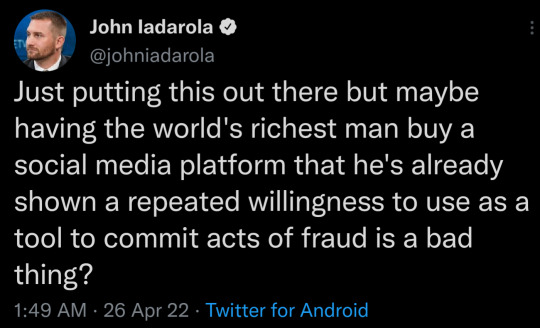#Big Tech
Text

More affluent older white people jeering and making a mockery of this young person who refuses to be complacent in Google's complicity in the ongoing genocide against Palestinian people. The raw materials used to make their products also depend on exploiting Congolese people -including young children, who mine for cobalt. Google, Apple -any company that relies on suffering, destruction, and death of ANY community around the world needs to be stopped. Keep boycotting. Keep speaking up about these injustices.
#feminist#social justice#free palestine#palestine#free gaza#current events#settler colonialism#settler violence#free congo#congo genocide#dr congo#congo#congo is bleeding#boycott#boycotting#us imperialism#western imperialism#global news#google#big tech#protest
14K notes
·
View notes
Text
Kickstarting a book to end enshittification, because Amazon will not carry it

My next book is The Internet Con: How to Seize the Means of Computation: it’s a Big Tech disassembly manual that explains how to disenshittify the web and bring back the old good internet. The hardcover comes from Verso on Sept 5, but the audiobook comes from me — because Amazon refuses to sell my audio:
https://www.kickstarter.com/projects/doctorow/the-internet-con-how-to-seize-the-means-of-computation
Amazon owns Audible, the monopoly audiobook platform that controls >90% of the audio market. They require mandatory DRM for every book sold, locking those books forever to Amazon’s monopoly platform. If you break up with Amazon, you have to throw away your entire audiobook library.
That’s a hell of a lot of leverage to hand to any company, let alone a rapacious monopoly that ran a program targeting small publishers called “Project Gazelle,” where execs were ordered to attack indie publishers “the way a cheetah would pursue a sickly gazelle”:
https://www.businessinsider.com/sadistic-amazon-treated-book-sellers-the-way-a-cheetah-would-pursue-a-sickly-gazelle-2013-10
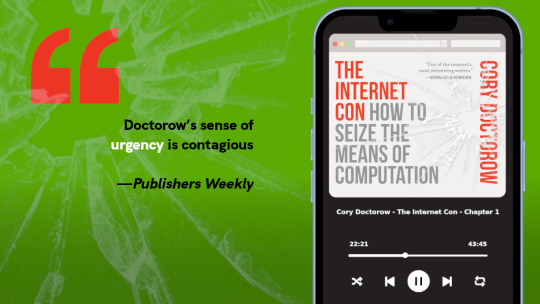
[Image ID: Journalist and novelist Doctorow (Red Team Blues) details a plan for how to break up Big Tech in this impassioned and perceptive manifesto….Doctorow’s sense of urgency is contagious -Publishers Weekly]
I won’t sell my work with DRM, because DRM is key to the enshittification of the internet. Enshittification is why the old, good internet died and became “five giant websites filled with screenshots of the other four” (h/t Tom Eastman). When a tech company can lock in its users and suppliers, it can drain value from both sides, using DRM and other lock-in gimmicks to keep their business even as they grow ever more miserable on the platform.
Here is how platforms die: first, they are good to their users; then they abuse their users to make things better for their business customers; finally, they abuse those business customers to claw back all the value for themselves. Then, they die:
https://pluralistic.net/2023/01/21/potemkin-ai/#hey-guys
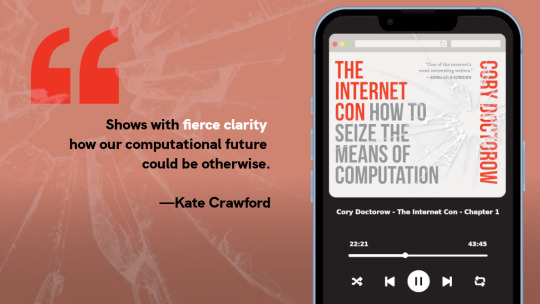
[Image ID: A brilliant barn burner of a book. Cory is one of the sharpest tech critics, and he shows with fierce clarity how our computational future could be otherwise -Kate Crawford, author of The Atlas of AI”]
The Internet Con isn’t just an analysis of where enshittification comes from: it’s a detailed, shovel-ready policy prescription for halting enshittification, throwing it into reverse and bringing back the old, good internet.
How do we do that? With interoperability: the ability to plug new technology into those crapulent, decaying platform. Interop lets you choose which parts of the service you want and block the parts you don’t (think of how an adblocker lets you take the take-it-or-leave “offer” from a website and reply with “How about nah?”):
https://www.eff.org/deeplinks/2019/07/adblocking-how-about-nah
But interop isn’t just about making platforms less terrible — it’s an explosive charge that demolishes walled gardens. With interop, you can leave a social media service, but keep talking to the people who stay. With interop, you can leave your mobile platform, but bring your apps and media with you to a rival’s service. With interop, you can break up with Amazon, and still keep your audiobooks.
So, if interop is so great, why isn’t it everywhere?
Well, it used to be. Interop is how Microsoft became the dominant operating system:
https://www.eff.org/deeplinks/2019/06/adversarial-interoperability-reviving-elegant-weapon-more-civilized-age-slay
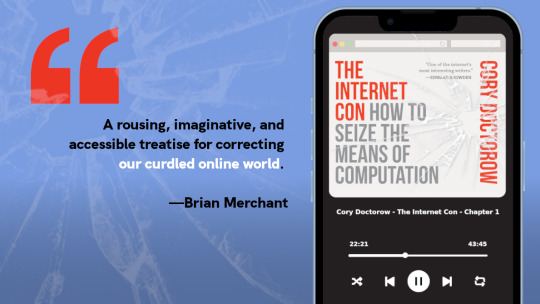
[Image ID: Nobody gets the internet-both the nuts and bolts that make it hum and the laws that shaped it into the mess it is-quite like Cory, and no one’s better qualified to deliver us a user manual for fixing it. That’s The Internet Con: a rousing, imaginative, and accessible treatise for correcting our curdled online world. If you care about the internet, get ready to dedicate yourself to making interoperability a reality. -Brian Merchant, author of Blood in the Machine]
It’s how Apple saved itself from Microsoft’s vicious campaign to destroy it:
https://www.eff.org/deeplinks/2019/06/adversarial-interoperability-reviving-elegant-weapon-more-civilized-age-slay
Every tech giant used interop to grow, and then every tech giant promptly turned around and attacked interoperators. Every pirate wants to be an admiral. When Big Tech did it, that was progress; when you do it back to Big Tech, that’s piracy. The tech giants used their monopoly power to make interop without permission illegal, creating a kind of “felony contempt of business model” (h/t Jay Freeman).
The Internet Con describes how this came to pass, but, more importantly, it tells us how to fix it. It lays out how we can combine different kinds of interop requirements (like the EU’s Digital Markets Act and Massachusetts’s Right to Repair law) with protections for reverse-engineering and other guerrilla tactics to create a system that is strong without being brittle, hard to cheat on and easy to enforce.
What’s more, this book explains how to get these policies: what existing legislative, regulatory and judicial powers can be invoked to make them a reality. Because we are living through the Great Enshittification, and crises erupt every ten seconds, and when those crises occur, the “good ideas lying around” can move from the fringes to the center in an eyeblink:
https://pluralistic.net/2023/06/12/only-a-crisis/#lets-gooooo

[Image ID: Thoughtfully written and patiently presented, The Internet Con explains how the promise of a free and open internet was lost to predatory business practices and the rush to commodify every aspect of our lives. An essential read for anyone that wants to understand how we lost control of our digital spaces and infrastructure to Silicon Valley’s tech giants, and how we can start fighting to get it back. -Tim Maughan, author of INFINITE DETAIL]
After all, we’ve known Big Tech was rotten for years, but we had no idea what to do about it. Every time a Big Tech colossus did something ghastly to millions or billions of people, we tried to fix the tech company. There’s no fixing the tech companies. They need to burn. The way to make users safe from Big Tech predators isn’t to make those predators behave better — it’s to evacuate those users:
https://pluralistic.net/2023/07/18/urban-wildlife-interface/#combustible-walled-gardens
I’ve been campaigning for human rights in the digital world for more than 20 years; I’ve been EFF’s European Director, representing the public interest at the EU, the UN, Westminster, Ottawa and DC. This is the subject I’ve devoted my life to, and I live my principles. I won’t let my books be sold with DRM, which means that Audible won’t carry my audiobooks. My agent tells me that this decision has cost me enough money to pay off my mortgage and put my kid through college. That’s a price I’m willing to pay if it means that my books aren’t enshittification bait.
But not selling on Audible has another cost, one that’s more important to me: a lot of readers prefer audiobooks and 9 out of 10 of those readers start and end their searches on Audible. When they don’t find an author there, they assume no audiobook exists, period. It got so bad I put up an audiobook on Amazon — me, reading an essay, explaining how Audible rips off writers and readers. It’s called “Why None of My Audiobooks Are For Sale on Audible”:
https://pluralistic.net/2022/07/25/can-you-hear-me-now/#acx-ripoff
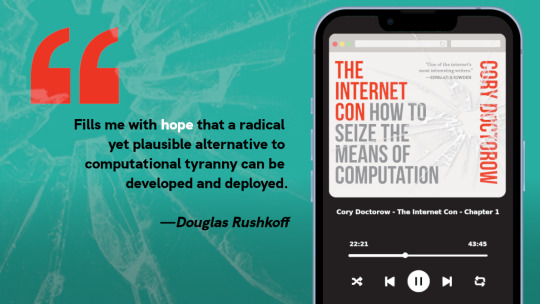
[Image ID: Doctorow has been thinking longer and smarter than anyone else I know about how we create and exchange value in a digital age. -Douglas Rushkoff, author of Present Shock]
To get my audiobooks into readers’ ears, I pre-sell them on Kickstarter. This has been wildly successful, both financially and as a means of getting other prominent authors to break up with Amazon and use crowdfunding to fill the gap. Writers like Brandon Sanderson are doing heroic work, smashing Amazon’s monopoly:
https://www.brandonsanderson.com/guest-editorial-cory-doctorow-is-a-bestselling-author-but-audible-wont-carry-his-audiobooks/
And to be frank, I love audiobooks, too. I swim every day as physio for a chronic pain condition, and I listen to 2–3 books/month on my underwater MP3 player, disappearing into an imaginary world as I scull back and forth in my public pool. I’m able to get those audiobooks on my MP3 player thanks to Libro.fm, a DRM-free store that supports indie booksellers all over the world:
https://blog.libro.fm/a-qa-with-mark-pearson-libro-fm-ceo-and-co-founder/
Producing my own audiobooks has been a dream. Working with Skyboat Media, I’ve gotten narrators like @wilwheaton, Amber Benson, @neil-gaiman and Stefan Rudnicki for my work:
https://craphound.com/shop/

[Image ID: “This book is the instruction manual Big Tech doesn’t want you to read. It deconstructs their crummy products, undemocratic business models, rigged legal regimes, and lies. Crack this book and help build something better. -Astra Taylor, author of Democracy May Not Exist, but We’ll Miss It When Its Gone”]
But for this title, I decided that I would read it myself. After all, I’ve been podcasting since 2006, reading my own work aloud every week or so, even as I traveled the world and gave thousands of speeches about the subject of this book. I was excited (and a little trepedatious) at the prospect, but how could I pass up a chance to work with director Gabrielle de Cuir, who has directed everyone from Anne Hathaway to LeVar Burton to Eric Idle?
Reader, I fucking nailed it. I went back to those daily recordings fully prepared to hate them, but they were good — even great (especially after my engineer John Taylor Williams mastered them). Listen for yourself!
https://archive.org/details/cory_doctorow_internet_con_chapter_01
I hope you’ll consider backing this Kickstarter. If you’ve ever read my free, open access, CC-licensed blog posts and novels, or listened to my podcasts, or come to one of my talks and wished there was a way to say thank you, this is it. These crowdfunders make my DRM-free publishing program viable, even as audiobooks grow more central to a writer’s income and even as a single company takes over nearly the entire audiobook market.
Backers can choose from the DRM-free audiobook, DRM-free ebook (EPUB and MOBI) and a hardcover — including a signed, personalized option, fulfilled through the great LA indie bookstore Book Soup:
https://www.kickstarter.com/projects/doctorow/the-internet-con-how-to-seize-the-means-of-computation
What’s more, these ebooks and audiobooks are unlike any you’ll get anywhere else because they are sold without any terms of service or license agreements. As has been the case since time immemorial, when you buy these books, they’re yours, and you are allowed to do anything with them that copyright law permits — give them away, lend them to friends, or simply read them with any technology you choose.
As with my previous Kickstarters, backers can get their audiobooks delivered with an app (from libro.fm) or as a folder of MP3s. That helps people who struggle with “sideloading,” a process that Apple and Google have made progressively harder, even as they force audiobook and ebook sellers to hand over a 30% app tax on every dollar they make:
https://www.kickstarter.com/projects/doctorow/red-team-blues-another-audiobook-that-amazon-wont-sell/posts/3788112
Enshittification is rotting every layer of the tech stack: mobile, payments, hosting, social, delivery, playback. Every tech company is pulling the rug out from under us, using the chokepoints they built between audiences and speakers, artists and fans, to pick all of our pockets.
The Internet Con isn’t just a lament for the internet we lost — it’s a plan to get it back. I hope you’ll get a copy and share it with the people you love, even as the tech platforms choke off your communities to pad their quarterly numbers.

Next weekend (Aug 4-6), I'll be in Austin for Armadillocon, a science fiction convention, where I'm the Guest of Honor:
https://armadillocon.org/d45/

If you'd like an essay-formatted version of this thread to read or share, here's a link to it on pluralistic.net, my surveillance-free, ad-free, tracker-free blog:
https://pluralistic.net/2023/07/31/seize-the-means-of-computation/#the-internet-con

[Image ID: My forthcoming book 'The Internet Con: How to Seize the Means of Computation' in various editions: Verso hardcover, audiobook displayed on a phone, and ebook displayed on an e-ink reader.]
#pluralistic#trustbusting#big tech#gift guide#kickstarter#the internet con#books#audiobooks#enshitiffication#disenshittification#crowdfunders#seize the means of computation#audible#amazon#verso
15K notes
·
View notes
Text
"The California state government has passed a landmark law that obligates technology companies to provide parts and manuals for repairing smartphones for seven years after their market release.
Senate Bill 244 passed 65-0 in the Assembly, and 38-0 in the Senate, and made California, the seat of so much of American technological hardware and software, the third state in the union to pass this so-called “right to repair” legislation.
On a more granular level, the bill guarantees consumers’ rights to replacement parts for three years’ time in the case of devices costing between $50 and $99, and seven years in the case of devices costing more than $100, with the bill retroactively affecting devices made and sold in 2021.
Similar laws have been passed in Minnesota and New York, but none with such a long-term period as California.
“Accessible, affordable, widely available repair benefits everyone,” said Kyle Wiens, the CEO of advocacy group iFixit, in a statement. “We’re especially thrilled to see this bill pass in the state where iFixit is headquartered, which also happens to be Big Tech’s backyard. Since Right to Repair can pass here, expect it to be on its way to a backyard near you.” ...
One of the reasons Wiens is cheering this on is because large manufacturers, from John Deere to Apple, have previously lobbied heavily against right-to-repair legislation for two reasons. One, it allows them to corner the repair and maintenance markets, and two, it [allegedly] protects their intellectual property and trade secrets from knock-offs or competition.
However, a byproduct of the difficulty of repairing modern electronics is that most people just throw them away.
...Wien added in the statement that he believes the California bill is a watershed that will cause a landslide of this legislation to come in the near future."
-via Good News Network, October 16, 2023
#united states#us politics#right to repair#planned obsolescence#enshittification#big tech#iphone#sustainability#ewaste#consumer rights#electronics#good news#hope#california#silicon valley
9K notes
·
View notes
Text
This is only the tip of the spear
394 notes
·
View notes
Text

Sign the Petition
Write to Congress
#capitalism#colonialism#palestine#economy#imperialism#israel#genocide#free congo#free palestine#rafah#all eyes on rafah#congo genocide#congo#democratic republic of the congo#drc#big tech#google#microsoft#cobalt#coltan#natural resources#internet#energy#climate change#exploitation#united states#united kingdom#france#geopolitics#petition
140 notes
·
View notes
Text
#america#african#africa#democratic republic of the congo#congo#free congo#save congo#sudan#save sudan#free sudan#big tech#big tech companies#smart phone#smart technologies#smartphone#smartwatch#apple#samsung#google
156 notes
·
View notes
Text
In 2012, Dutch teenager Boyan Slat presented a TED Talk on his concept for cleaning up the ocean with simple mechanisms to sweep up all the trash. While scientists and plastics experts cautioned that his ideas were ineffective, Slat’s non-profit the Ocean Cleanup, founded the year after his talk went viral, has gained millions of followers and big-name backers, including Salesforce, Maersk, KIA, and PayPal’s Peter Thiel. But the venture had one major problem: its first two designs didn’t work, despite the group burning through tens of millions of dollars over the course of a decade. The Ocean Cleanup has since pivoted to work with upstream river “interceptors” that are much more efficient at capturing garbage, but its website still prominently features its latest ocean debris “solution”—essentially a trawl fishing net dragged between two boats that has, to date, collected a comparatively miniscule amount of trash.
Tech projects like these are more of a curse than a blessing. Even if the Ocean Cleanup one day somehow beats the insurmountable odds and removes all surface-level traces of plastic marine pollution, it’d still be missing the vast majority of waste that sinks to the bottom of the ocean floor, or breaks up into tiny microplastics. While companies like these bring increased attention to the plastics crisis, they’re ultimately flashy gimmicks that lull our public consciousness into thinking a clever gadget can solve a collective-action problem. These projects also allow consumer brands—like Coca-Cola, an official “Global Implementation Partner” of Slat’s group—to greenwash their continued massive plastic production, while lobbying behind-the-scenes against regulations that would actually help the world break its plastic addiction.
“We now know that we can’t start to reduce plastic pollution without a reduction of production,” environmental scientists Imari Walker-Franklin and Jenna Jambeck write in the introduction to their forthcoming study, Plastics. To meaningfully address this crisis and others like it, we need to look upstream, invest in reuse infrastructure, and mandate biodegradable packaging and high material recyclability. At a minimum, we need to start making producers bear the cost for the collection and disposal of their poorly designed goods.
219 notes
·
View notes
Text


i designed a flag/symbol for the right to repair movement because i believe it is Bull Shit that i cant repair my own phone without special tools. rights and use for making sellable stuff below the cut
feel free to use for online posters and homemade patches and stuff. i have a shop with stickers and printed shirts if u want to buy, i get $1.50 per sale so most of the cost covers the production. itll be in the replies, as the only reply probably.
id prefer if mass printed stuff thru like. teespring and redbubble was avoided as i have a shop thru that myself, but im not gonna enforce it. colors were inspired from teh communist flag ffs. its just if u wanna support me.
#right to repair#planned obsolescence#enshittification#big tech#tech literacy#computer literacy#ruby draws#my art#internet#the internet#computers#tagged for reach
57 notes
·
View notes
Text
by Julia Steinberg
Within the first minute of scrolling under a search for “Zionism” on TikTok, I saw a “Zionism Explained” video with over 125,000 views. It said that Jews are forbidden by God to have their own state, completely ignoring the fact that the State of Israel is secular. “How did this start? Let’s go back to 1897,” the video instructs. But Jewish history in Israel started thousands of years ago, not in 1897.
When I searched “history” on TikTok, a woman with the “cute freckles and lashes” filter told me and over 80,000 viewers that, in “the biggest plot twist of the century,” Jews are using their ancestors’ “tragedy to justify and inflict another Holocaust.”
That explainer video is why, when I went to a pro-Palestine rally at Stanford on Wednesday and asked a fellow student what she meant when she chanted “from the river to the sea,” she said that, after admitting she wasn’t knowledgeable about the issue, Palestine must be free from the Tigris River (in Iraq) to the Black Sea (north of Turkey). This student, though she has no sense of geography, is actually chanting for the land from the Jordan River to the Mediterranean Sea to no longer contain the state of Israel. It is an eliminationist slogan.
I saw a similar message at an off-campus café recently when I walked by a girl whose laptop bore a newly applied sticker with the words “By Any Means Necessary” stamped over an outline of Israel. It’s been less than three weeks since October 7 and already these glib stickers plugging genocide, aimed at my generation, are proliferating.
A new axis of evil—Big Tech, social media companies, and China—has taken the once-fringe position that Jews are undeserving of a homeland, and is now pushing the idea of their mass slaughter via shoddy animation and beautiful women hosting “explainer” videos. And it’s trickling down onto t-shirts and “cute” laptop stickers.
It’s cool to promote hate.
My Jewish parents, whose hearts break to hear about what I go through at college, did everything they could so that my brother and I would reject this simplistic, horrible way of thinking. But they can’t change that my little brother’s high school also teaches ideology with T-charts. I doubt his teachers or classmates care to understand that no T-chart can account for why he and his Jewish friends feel sick when they see slogans calling for their deaths.
135 notes
·
View notes
Text
We're gearing up for the ISG Virtual Convention
Indie sellers deserve an internet where it's possible to earn a fair living wage for creative work.
Shoppers deserve an internet where it's possible to support the makers, creators, and small businesses that you love, without so much of your payment being gobbled up by big tech platforms.
Together, we can build that internet.
Learn more at the first annual Indie Sellers Guild Virtual Convention, scheduled for April 13-14, 2024, entitled—
Support Small Sellers: Freedom from Etsy and other Big Tech
See what we have planned through the link below, and register to attend for only 1 USD.
We hope to see you there!
#Isg#support indie artists#support small artists#support small business#small business#workers rights#indie sellers guild#indie sellers#ISG virtual convention#Etsy#Big tech
62 notes
·
View notes
Text




An example of Pinterest's pro-zionist inclinations: the first picture, a man stating on cardboard signage 'If you wonder what you would have done in Nazi Germany, you are doing it today', is suppressed as 'hateful'. The second, the most simple and blantant naturalization of colonalism, mind-bending to see in this day and age, stays up. 'No action taken'.
#palestine#pinterest#free palestine#free gaza#israel#gaza#jerusalem#from the river to the sea palestine will be free#gaza strip#tel aviv#joe biden#social media#big tech
38 notes
·
View notes
Text
An Epic antitrust loss for Google
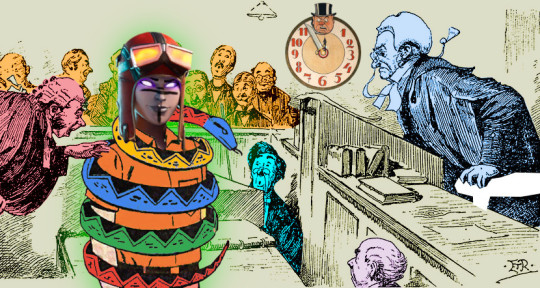
A jury just found Google guilty on all counts of antitrust violations stemming from its dispute with Epic, maker of Fortnite, which brought a variety of claims related to how Google runs its app marketplace. This is huge:
https://www.nytimes.com/2023/12/11/technology/epic-games-google-antitrust-ruling.html
The mobile app store world is a duopoly run by Google and Apple. Both use a variety of tactics to prevent their customers from installing third party app stores, which funnels all app makers into their own app stores. Those app stores cream an eye-popping 30% off every purchase made in an app.
This is a shocking amount to charge for payment processing. The payments sector is incredibly monopolized and notorious for its price-gouging – and its standard (wildly inflated) rate is 2-5%:
https://pluralistic.net/2023/08/04/owning-the-libs/#swiper-no-swiping
Now, in theory, Epic doesn't have to sell in Google Play, the official Android app store. Unlike Apple's iOS, Android permit both sideloading (installing an app directly without using an app store) and configuring your device to use a different app store. In practice, Google uses a variety of anticompetitive tricks to prevent these app stores from springing up and to dissuade Android users from sideloading. Proving that Google's actions – like paying Activision $360m as part of "Project Hug" (no, really!) – were intended to prevent new app storesfrom springing up was a big lift for Epic. But they managed it, in large part thanks to Google's own internal communications, wherein executives admitted that this was exactly why Project Hug existed. This is part of a pattern with Big Tech antitrust: many of the charges are theoretically very hard to make stick, but because the companies put their evil plans in writing (think of the fraudulent crypto exchange FTX, whose top execs all conferred in a groupchat called "Wirefraud"), Big Tech keeps losing in court:
https://pluralistic.net/2023/09/03/big-tech-cant-stop-telling-on-itself/
Now, I do like to dunk on Big Tech for this kind of thing, because it's objectively funny and because the companies make so many unforced errors. But in an important sense, this kind of written record is impossible to avoid. Any large institution can only make and enact policy through administrative systems, and those systems leave behind a paper-trail: memos, meeting minutes, etc. Yes, we all know that quote from The Wire: "Is you taking notes on a fucking criminal conspiracy?" But inevitably, any ambitious conspiracy can only exist if someone is taking notes.
What's more, any large conspiracy involving lots of parties will inevitably produce leaks. Think of this as the corollary to the idea that the moon landing can't be a hoax, because there's no way 400,000 co-conspirators could keep the secret. Big Tech's conspiracies required hundreds or even thousands of collaborators to keep their mouths shut, and eventually someone blabs:
https://www.science.org/content/article/fake-moon-landing-you-d-need-400000-conspirators
This is part of a wave of antitrust cases being brought against the tech giants. As Matt Stoller writes, the guilty-on-all-counts jury verdict will leak into current and future actions. Remember, Google spent much of this year in court fighting the DoJ, who argued that the company bribed Apple not to make a competing search engine, paying tens of billions every year to keep a competitor from emerging. Now that a jury has convinced Google of doing that to prevent alternative app stores from emerging, claims that it used these pay-for-delay tactics in other sectros get a lot more credible:
https://www.thebignewsletter.com/p/boom-google-loses-antitrust-case
On that note: what about Apple? Epic brought a very similar case against Apple and lost. Both Apple and Epic are appealing that case to the Supreme Court, and now that Google has been convicted in a similar case, it might prompt the Supremes to weigh in and resolve the seeming inconsistencies in the interpretation of federal law.
This is a key moment in the long project to wrest antitrust away from the pro-monopoly side, who spent decades "training" judges to produce verdicts that run counter to the plain language of America's antitrust law:
https://pluralistic.net/2021/08/13/post-bork-era/#manne-down
There's 40 years' worth of bad precedent to overturn. The good news is that we've got the law on our side. Literally, the wording of the laws and the records of the Congressional debate leading to their passage, all militate towards the (incredibly obvious) conclusion that the purpose of anti-monopoly law is to fight monopoly, not defend it:
https://pluralistic.net/2023/04/14/aiming-at-dollars/#not-men
It's amazing to realize that we got into this monopoly quagmire because judges just literally refused to enforce the law. That's what makes one part of the jury verdict against Google so exciting: the jury found that Google's insistence that Play Store sellers use its payment processor was an act of illegal tying. Today, "tying" is an obscure legal theory, but few doctrines would be more useful in disenshittifying the internet. A company is guilty of illegal tying when it forces you to use unrelated products or services as a condition of using the product you actually want. The abandonment of tying led to a host of horribles, from printer companies forcing you to buy ink at $10,000/gallon to Livenation forcing venues to sell tickets through its Ticketmaster subsidiary.
The next phase of this comes when the judge decides on the penalty. Epic doesn't want cash damages – it wants the judge to order Google to fulfill its promise of "an open, competitive Android ecosystem for all users and industry participants." They've asked the judge to order Google to facilitate third-party app stores, and to separate app stores from payment processors. As Stoller puts it, they want to "crush Google’s control over Android":
https://www.epicgames.com/site/en-US/news/epic-v-google-trial-verdict-a-win-for-all-developers
Google has sworn to appeal, surprising no one. The Times's expert says that they will have a tough time winning, given how clear the verdict was. Whatever this means for Google and Android, it means a lot for a future free from monopolies.

If you'd like an essay-formatted version of this post to read or share, here's a link to it on pluralistic.net, my surveillance-free, ad-free, tracker-free blog:
https://pluralistic.net/2023/12/12/im-feeling-lucky/#hugger-mugger
#pluralistic#conspiracies#big tech#discovery#ai#copyright#copyfight#app stores#circuit splits#apple#apple v epic#law#trustbusting#competition#monopolies#google#epic#google v epic#fortnite#antitrust#tying#payment processing#scotus#project hug#pay for delay#games#gaming
1K notes
·
View notes
Text
"Is social media designed to reward people for acting badly?
The answer is clearly yes, given that the reward structure on social media platforms relies on popularity, as indicated by the number of responses – likes and comments – a post receives from other users. Black-box algorithms then further amplify the spread of posts that have attracted attention.
Sharing widely read content, by itself, isn’t a problem. But it becomes a problem when attention-getting, controversial content is prioritized by design. Given the design of social media sites, users form habits to automatically share the most engaging information regardless of its accuracy and potential harm. Offensive statements, attacks on out groups and false news are amplified, and misinformation often spreads further and faster than the truth.
We are two social psychologists and a marketing scholar. Our research, presented at the 2023 Nobel Prize Summit, shows that social media actually has the ability to create user habits to share high-quality content. After a few tweaks to the reward structure of social media platforms, users begin to share information that is accurate and fact-based...
Re-targeting rewards
To investigate the effect of a new reward structure, we gave financial rewards to some users for sharing accurate content and not sharing misinformation. These financial rewards simulated the positive social feedback, such as likes, that users typically receive when they share content on platforms. In essence, we created a new reward structure based on accuracy instead of attention.
As on popular social media platforms, participants in our research learned what got rewarded by sharing information and observing the outcome, without being explicitly informed of the rewards beforehand. This means that the intervention did not change the users’ goals, just their online experiences. After the change in reward structure, participants shared significantly more content that was accurate. More remarkably, users continued to share accurate content even after we removed rewards for accuracy in a subsequent round of testing. These results show that users can be given incentives to share accurate information as a matter of habit.
A different group of users received rewards for sharing misinformation and for not sharing accurate content. Surprisingly, their sharing most resembled that of users who shared news as they normally would, without any financial reward. The striking similarity between these groups reveals that social media platforms encourage users to share attention-getting content that engages others at the expense of accuracy and safety...
Doing right and doing well
Our approach, using the existing rewards on social media to create incentives for accuracy, tackles misinformation spread without significantly disrupting the sites’ business model. This has the additional advantage of altering rewards instead of introducing content restrictions, which are often controversial and costly in financial and human terms.
Implementing our proposed reward system for news sharing carries minimal costs and can be easily integrated into existing platforms. The key idea is to provide users with rewards in the form of social recognition when they share accurate news content. This can be achieved by introducing response buttons to indicate trust and accuracy. By incorporating social recognition for accurate content, algorithms that amplify popular content can leverage crowdsourcing to identify and amplify truthful information.
Both sides of the political aisle now agree that social media has challenges, and our data pinpoints the root of the problem: the design of social media platforms."
And here's the video of one of the scientsts presenting this research at the Nobel Prize Summit!
youtube
-Article via The Conversation, August 1, 2023. Video via the Nobel Prize's official Youtube channel, Nobel Prize, posted May 31, 2023.
#social media#misinformation#social networks#social#algorithm#big tech#technology#enshittification#internet#nobel prize#psychology#behavioral psychology#good news#hope#Youtube#video
447 notes
·
View notes
Text
Dark patterns. That's how big tech gets away with confusing screens and settings. Even the most seasoned and experienced IT professionals, developers, or tech enthusiasts can get confused. This meme is about big-time and small-time crooks who know how to game the system. The majority of us aren't cut out for a life of crime. We'll stick with our 9-to-5 routines..

43 notes
·
View notes

